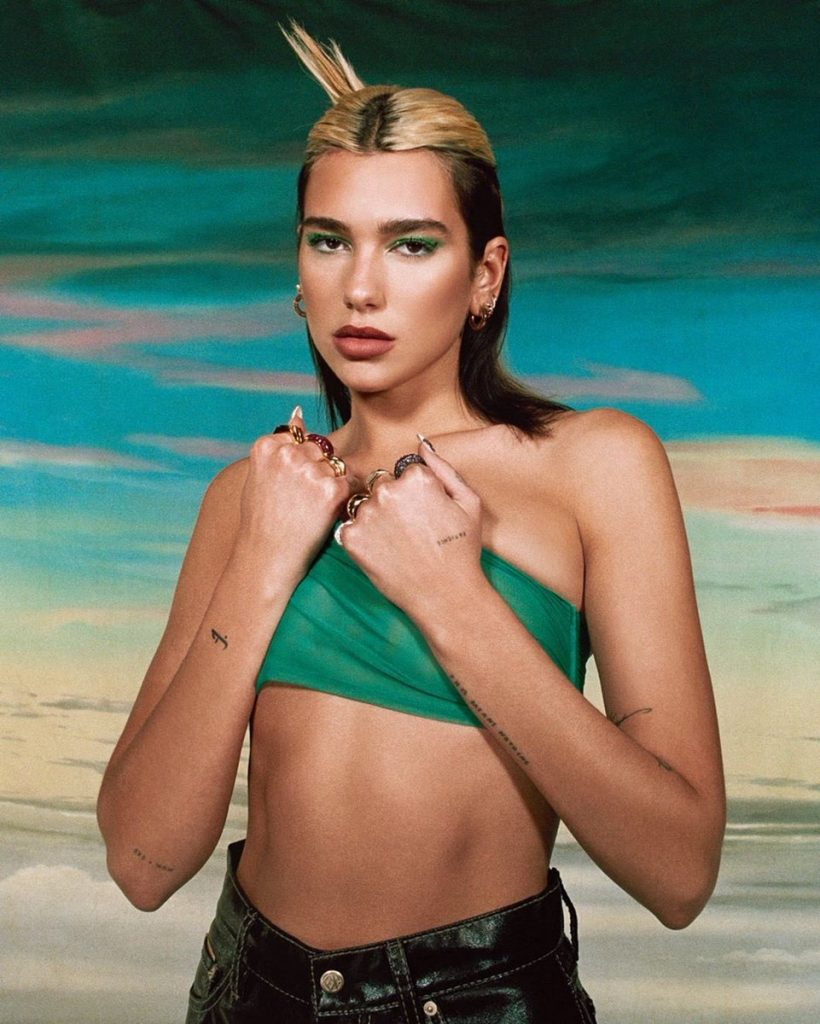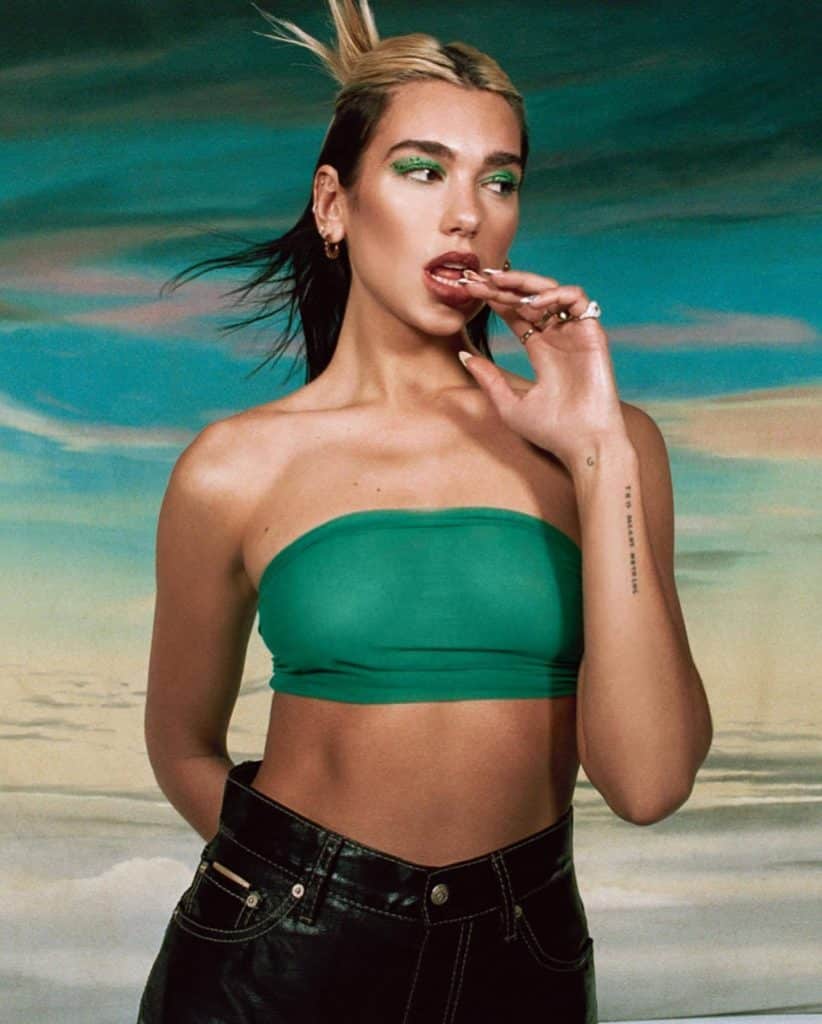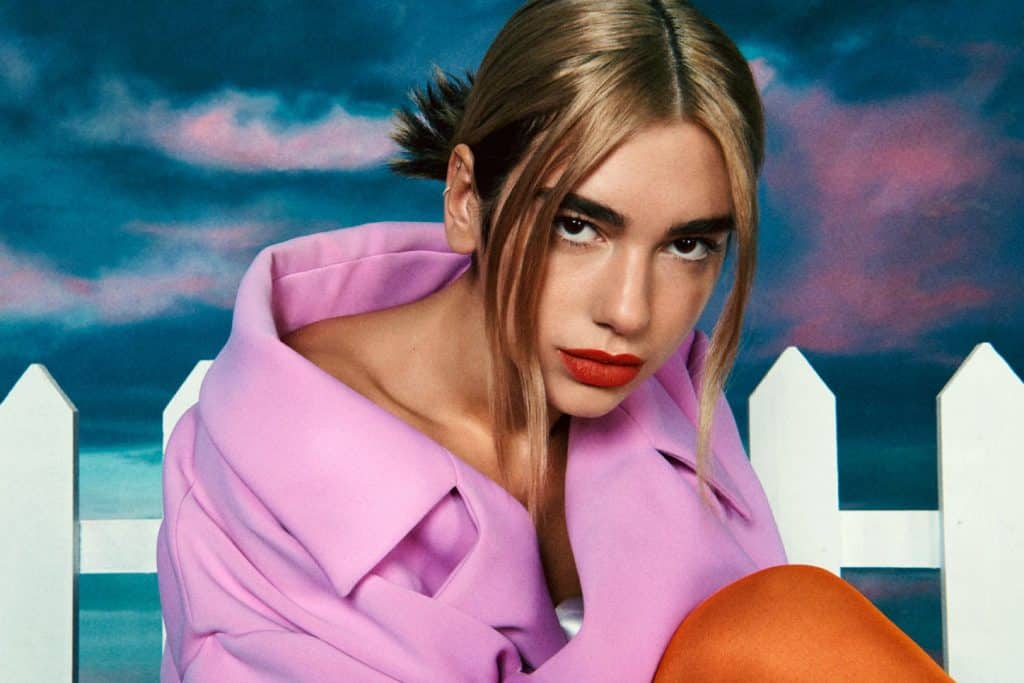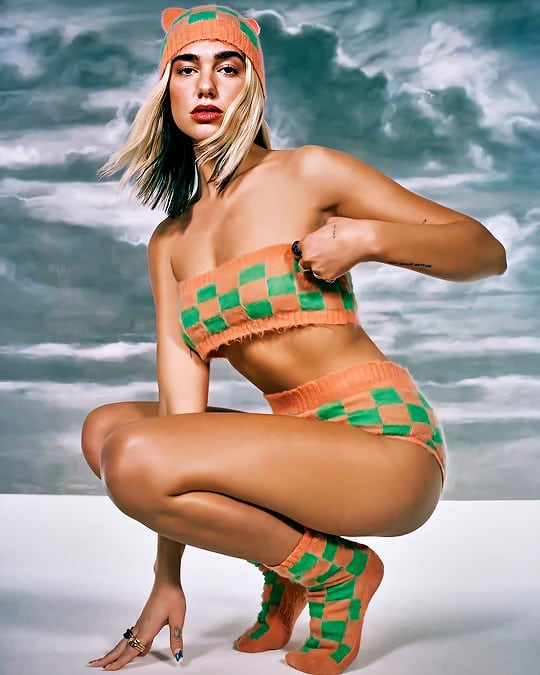“Everybody thinks that, as a woman, you have to be so careful about how you portray yourself or how you talk about sex,” Dua Lipa told The Guardian, “Everything has to be really sweet.”
It was 2020 and she was discussing Good In Bed, a fun, tongue-in-cheek track from her newly-released second album, Future Nostalgia. Following three years of work on the project, Dua had planned to unveil Future Nostalgia on April 3rd but was forced to bring the release date forward after the content of the album was leaked online.
In the end, the album was released officially on the first Friday of the UK’s COVID-19 lockdown – perhaps not the greatest outcome from an artist’s point of view, given the worldwide pause on live events and non-essential travel. For fans, however, Future Nostalgia arrived at the perfect time.
The world was in the throes of an unprecedented situation – it was at a point during the pandemic when there were no tests, no vaccines and when the phrase ‘social distancing’ was yet to find its way into the global lexicon. Locked away from family and friends, we were unified in worry, confusion and apprehension – what the world needed was a pick-me-up and music is one of the greatest out there.
Given the situation, Dua was understandably back and forth on whether or not it was the right time to release her new tracks. She’d been working on the project for so long – a pandemic release could only be anti-climactic, couldn’t it?
However, with the situation taken out of her hands after the tracks were leaked, she had eventually decided to press ahead with the release in the hope that her work could provide fans with a welcome distraction from the seemingly endless bad news. It’s a decision that many were incredibly pleased about.
A disco-dappled follow-up to her self-titled debut album, Future Nostalgia was a vibrant and, fittingly, nostalgic collection of tracks, each beautifully utilising the trademarks of dance, pop and electronic sounds of years gone by. It was quite the tonic, delightfully upbeat in the face of a situation that had thrown the world for a loop – whilst Dua hadn’t planned to release an album during a global pandemic, it’s easy to feel as though things panned out exactly as they always should have done.
The album was immediately met with widespread praise, from critics, fans and casual listeners alike. She had already enjoyed a taste of this acclaim following the pre-pandemic release of the album’s leading singles, with tracks Levitating and Don’t Start Now having fallen just short of topping the charts, but the release of the full album put Dua right back at the forefront of the modern pop landscape, right where she’d found herself following the release of her breakout hit, New Rules.
The months that followed saw Dua in the running for just about every accolade on the wishlist of any artist, even winning her the Grammy for Best Pop Vocal Album.
The universal acclaim that welcomed Future Nostalgia was, in many ways, poetic. Whilst the album’s sound was greatly influenced by the tracks that a young Dua had grown up enjoying, the intention of the album was inspired, first and foremost, by a wish to stay true to herself and do something fun. Had she simply attempted to produce a more widely-palatable collection of tracks, driven only by the aim to please the crowd, it may have been a very different story.


However, the central focus of the album was born from a place of avoiding such aims of wanting to appease the masses – something she had realised would be impossible following online criticism that had been sent her way in response to the praise that her previous work had received.
“People almost made me feel bad about my achievements, or didn’t allow me to feel proud of the things that I’ve done because they made me feel like I was almost unworthy of them,” she said.
“Even though I know I’ve worked really hard and I did so much of the work, the performances and behind the scenes.”
It was clear to Dua that there would always be those who disagreed with the awards and acclaim that her work was given.
“People being like: ‘She’s been fucking ‘best new artist’ for so long and she doesn’t deserve that, blah blah blah’.”
“There were times that I felt people were being so mean that when someone recognised me and said: ‘I really like your music,’ I’d be like: ‘Oh my God, not everyone hates me!’”
In response, she decided to follow her own interests and intuitions when producing future music, regardless of whether or not it appeals to the crowd. It appears to have been an incredibly successful route to take.
It’s easy to see why such criticism would have gotten to Dua Lipa in the past, especially considering just how hard she’d had to work to get to where she is. Whilst it may have appeared to some that she had burst into the mainstream without warning following New Rules, she’d been putting in no shortage of hard work behind the scenes for years in the lead-up to her eventual big break.
Born in 1995 to Kosovar-Albanian Muslim parents who had left Kosovo following increasing conflict within their home country, Dua was raised in London until her family returned to Pristina when she was ten. Having dreamed for years of a career in music, she returned to the UK five years later after convincing her parents that she would have more opportunities to pursue higher education if she graduated from a British school – what she was really pursuing in London, however, was a successful career in pop. Desperate to achieve these long-held goals, she spent the latter half of her teenage years relentlessly working to catch the attention of those with the power to help her on her way, sending out hundreds of demos and networking at every opportunity. Eventually, she found herself signing with the management team behind Lana Del Rey and with Warner Music soon after.

Even then, it was a long road to mainstream success. Though her initial singles under Warner weren’t doing particularly well in the charts, Dua was determined not to lose sight of her goals or doubt her abilities to achieve them, instead deciding to focus all her efforts on honing the skills needed to be a bona fide popstar.
“With every song, the momentum was building, but only tiny little bits,” she explains.
“I was doing new things, I was learning what was expected of me, how to be in front of a camera, how to better the last performance.”
Then, at long last, came her first taste of life at the top with the release of New Rules, which Dua describes as being ‘rocket fuel’ to her career. From there, it was clear that she was a force to be reckoned with.
In the years since, there’s been scarcely a release by Dua that hasn’t well and truly made its mark on the charts. In 2018, she worked with Calvin Harris on One Kiss, which went on to top the UK charts for eight consecutive weeks and become that year’s biggest-selling track. The collaboration came just after her second taste of solo success with the single IDGAF – a fittingly cool follow-up to the narrative of New Rules – and just before Dua went on to work with Mark Ronson and Diplo on the powerful dance track Electricity.
Naturally, when she returned in October 2019 with Don’t Start Now and announced Future Nostalgia, there was little doubt that the subsequent album would be an instant hit.
With success, of course, comes a growing platform and an opportunity to carry a message to the masses – a responsibility which Dua appears to treat with great care. Since the beginning, she’s never been one to sit on the fence or to shy away from speaking her mind, having consistently used her position to educate fans and followers on a variety of political and social issues.
It’s a mission that she has made sure to incorporate into Future Nostalgia, too, concluding the album with its standalone power-ballad, Boys Will Be Boys. An abrupt and stark contrast from the high-energy and party feeling of tracks that come before, the closer sees Dua comment on the struggle that women in and out of the public eye face due to sexism and the normalisation of questionable male behaviour.
Whilst it’s a problem she’s been faced with throughout her life, she’s certainly noticed the increased scrutiny she faces as a woman who has amassed a certain level of fame.
“The scrutiny not just on social media but in the media, especially towards women, is so intense and unkind and really trying to get a rise out of people,” she explains.
“The tabloids know very well what they’re doing, and it really affects everyone. You have to be made out of steel to not let words get to you.”


Despite her efforts to speak up for women, however, Dua has previously faced criticism for objectifying sex workers after a video of herself and Lizzo throwing money at a dancer in an LA strip club made the rounds online. The incident even saw Dua get her first taste of so-called cancel culture as the hashtag #dualipaisoverparty began trending on Twitter.
Whilst some in such a position may have been tempted to apologise to simply keep the peace, Dua wasn’t so willing to back down, deciding not to respond to the backlash.
“I don’t like to apologise if I don’t believe I should be apologising for something,” she says, speaking on her surprise at the fact that the video caused any offence in the first place.
“I believe in supporting women in all fields of work. Nothing at that party was derogatory; everyone was just dancing and having fun. That’s something we all have to work on – not every sex worker is being forced to do something they don’t wanna do. I think a lot of the women found it really empowering and really like to dance.”
It’s clear that Dua has no plans to let up in her mission to change the way that women are seen in the media, feeling that the work of women in the public eye is undermined, underestimated and underappreciated all too often.
“We all have to work a little bit harder to be taken seriously, but it’s not something that we’re not used to doing,” she says.
So, does she see a better, more equal future on the horizon for women in music?
“Time will tell. In the meantime, I’ll just work for people to take me seriously.”
READ MORE: Cardi B: “Every Single Time A Female Rapper Comes Out, People Wanna Start Fake Beef.”


